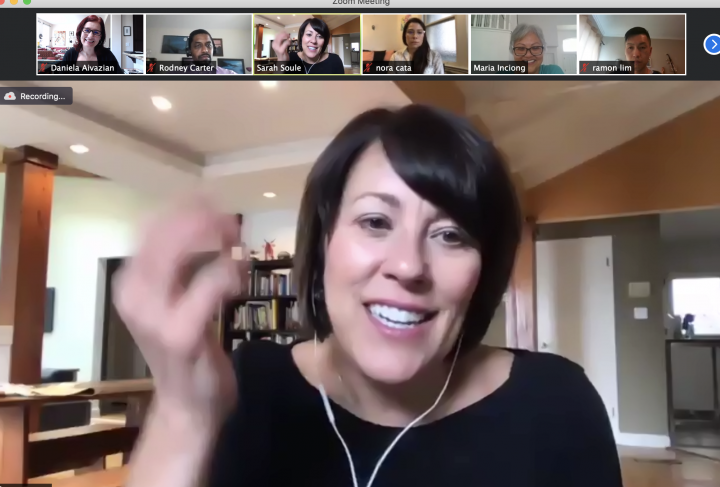On May 13, the Stanford People of Color in Technology (POC-IT) affinity group held its second event, which was also its first Zoom-only event. As the newest pillar of IDEAL IT, POC-IT works to advance representation, engagement, and support for people of color in technology roles at Stanford.
A Warm Welcome
Introductory remarks were made by UIT Chief of Staff and CIO Council Sponsor, Nancy Ware, and POC-IT Program Lead Rodney Carter. Nancy spoke about how she started the week with the low of the release of the Ahmaud Arbery video and then went on to discuss the highs she experienced which included thinking about the diversity of students at the upcoming Stanford graduation.
Rodney discussed the creation of four planning committees which will help advance POC-IT efforts across the university. He emphasized that POC-IT is open to everyone, regardless of color, and addressed the departure of one of POC-IT’s sponsors from Stanford, Professor Harry Elam.
Inclusivity at the Graduate School of Business
Professor and Senior Associate Dean for Academic Affairs, Sarah Soule, gave the keynote address on Diversity, Equity and Inclusion (DEI) efforts in the Stanford Graduate School of Business (GSB). Soule discussed how a grassroots movement that has existed for some time at the GSB has gained traction with the support of the Dean.
Soule focused her talk on the following five priorities from the 2019 GSB DEI report:
- Increase the diversity of the GSB community
- Create an inclusive classroom and learning experience
- Create an inclusive and welcoming campus community
- Empower and support underrepresented communities
- Support new research efforts
Programs for Ph.D. students and research fellows, as well as podcasts that focus on diversity efforts, have been at the center of increasing the diversity of the GSB community. When it comes to inclusivity in the classroom, publishing the findings of case studies about stereotypes has helped inspire broader change. Dean Soule also shared insights from her research and shared three recent articles with the POC-IT community (included in the Resources section below).
Learning about Microaggressions
After a brief reflection exercise on Dean Soule’s talk led by Mark Matienzo, POC-IT Advisory Group member, and assistant director for digital strategy and access for the Stanford Libraries, Dani Aivazian led a thought-provoking mini-workshop about microaggressions. Participants were asked to reflect and share their personal experiences with microaggressions, as well as tips, tools, and strategies that could work effectively to mitigate the effect of the microaggressions. Micro-inclusions and micro-affirmations — in the forms of active listening, validating experiences, and affirming emotional reactions — help combat microaggressions.
The workshop recognized that sometimes positive micro behaviors are not enough. Sometimes the necessary response is to call someone out on their words or actions. It can also be important to call someone into a conversation to address any missteps they may have taken. As the activist, Fen Slattery described it: “Calling out looks like pointing at someone and telling a group, ‘This person did a thing! And it was bad!’ Calling in is taking that person aside and putting your arm over their shoulders and saying, ‘Hey, friend, you did a thing that hurt some folks. Let’s talk about that.’”
Closing Thoughts
Rodney closed out the event by expressing how he hoped that everyone learned at least one new thing. He discussed how technology has helped manage the impact of COVID-19 and how it has also provided the ability to telecommute and stay connected.
“People of color have both the ability and the skills to help get this virus under control and to help those who are safe at home to stay connected and productive. What’s often missing is the opportunity. And that’s what POC-IT is here to address.”
Nora Cata, POC-IT Advisory Group member and growth marketing specialist for Stanford’s Technology Ventures Program, closed the meeting by connecting the dots between the various presentations and activities. She ended on an uplifting note, reminding everyone of Eleanor Roosevelt’s hopeful words: “It is better to light a candle than to curse the darkness.”
Learn more about this event and ways to get involved by taking a look at the following resources.
Additional Resources
Images of the Event
Zoom Recording of the Event
Event Presentation
People of Color in Technology Webpage
Harvard Business Review Article: Changing Company Culture Requires a Movement, Not a Mandate
Harvard Business Review Article: The Stereotypes in MBA Case Studies
Harvard Business Review Article: How to Be an Inclusive Leader Through a Crisis
Interrupting Microaggressions Tool
Interrupting Bias: Calling Out vs. Calling In


